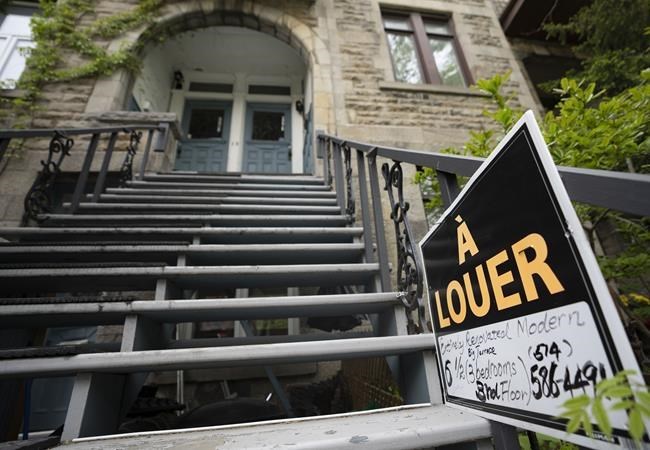TORONTO — The average asking price for a rental unit in Canada reached a record $2,042 last month amid continued interest rate hikes and population expansion, according to a new report by Rentals.ca and Urbanation.
The data, which analyzed monthly listings from the Rentals.ca network, showed year-over-year rent inflation for June was 7.5 per cent, below the double-digit growth seen for most of 2022 and early 2023.
Rents also rose 1.4 per cent from May, marking the fastest month-over-month increase for units listed on the website so far this year.
"What the country is experiencing right now is a perfect storm of conditions," said Shaun Hildebrand, president of Urbanation, a real estate research firm.
"It's interesting that rents continue to grow this fast despite rental apartment completions in Canada currently running at multi-decade highs. It really shows that the housing industry isn't producing enough rental supply to satisfy this record level of rental demand."
The average cost of a one-bedroom unit in June was $1,780, up 10.2 per cent from the same month in 2022.
Hildebrand said demand is being driven by Canada's rapid population growth, much of which is coming from non-permanent residents such as foreign students who rent, along with near record-low unemployment, rising incomes and "the worst home ownership affordability in over a generation for first-time buyers."
High interest rates are a "key ingredient" to the lack of housing affordability, said Hildebrand. He predicted the Bank of Canada's latest rate hike earlier this week would worsen existing barriers to entry for renters looking to buy a home.
"It'll reduce supply by keeping renters in their units for longer, it'll convert more would-be first-time buyers into longer term renters," he said.
"Just as meaningfully, it'll slow down the supply pipeline of new apartment projects because higher interest rates, obviously, raise the costs of developing."
Vancouver led the way as Canada's priciest city for renters, with the average one-bedroom unit listed at $2,945 and a two-bedroom at $3,863, followed by nearby Burnaby, B.C., according to the report.
Toronto ranked third at $2,572 for a one-bedroom and $3,301 for a two-bedroom.
A separate report released Thursday by the Toronto Regional Real Estate Board showed average condominium apartment rents in the Greater Toronto Area continued to outpace the rate of inflation in the second quarter of 2023.
The average one-bedroom condo apartment rent was $2,532 over those three months — up 11.6 per cent compared with 2022. The average two-bedroom rent was up 9.2 per cent over the same period to $3,264.
RBC economist Rachel Battaglia said those regions, along with Halifax, continue to see vacancy rates in the rental market hover around one per cent or lower — well below the three per cent rate that experts consider a sign of a balanced market.
She said Canada's annual rate of population growth during the second quarter reached its fastest pace since the 1950s.
"We do have a population growing at a pretty astonishing pace," said Battaglia, noting international immigrants tend to rent for the first five to seven years of living in Canada, adding pressures to the rental market.
"Although there have been some healthy additions to the rental unit stock, it just hasn't kept pace with demand."
Over the past two years, average asking rents in Canada have increased by 20 per cent, or an average of $341, according to the Rentals.ca report.
On a monthly basis, rent growth was strongest in June for the smallest and least expensive unit types, with studios and one-bedrooms seeing price listings rise 2.6 and two per cent during the month, respectively.
Each of Canada’s six largest cities experienced double-digit annual rent inflation in June for purpose-built and condominium apartments.
Vancouver and Toronto, the country’s most expensive rental markets, had average asking rents of $3,301 and $2,813, respectively, representing annual growth of 15.7 and 15.4 per cent. Ottawa, the third most expensive of Canada’s largest markets with an average asking rent of $2,146 in June, saw growth of 15.3 per cent.
Calgary overtook Montreal as the fourth most expensive among Canada’s largest cities, with average asking rents for purpose-built and condominium apartments growing 18.4 per cent annually to reach $2,008 — surpassing the $2,000 level for the first time.
"The areas of the country that are experiencing the fastest rates of population increases are the areas that are experiencing the fastest rent increases. I don't think there's any coincidence there," said Hildebrand.
"Areas like Calgary, Toronto and more specifically, markets like Scarborough and Brampton which tend to attract a high percentage of new immigrants, are seeing rent increases that are at really the top of the list."
This report by The Canadian Press was first published July 13, 2023.
Sammy Hudes, The Canadian Press

